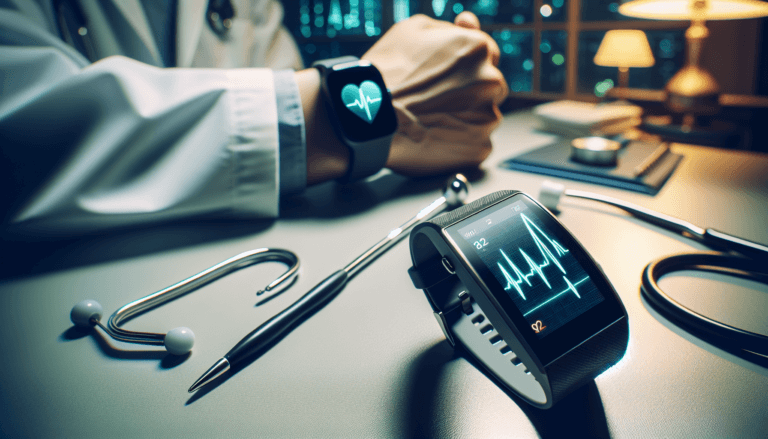Learn more about FitBit AFib detection in this article. Heart health is a crucial aspect of overall wellness, and with innovative technology like Fitbit’s AFib monitoring, keeping tabs on your heart’s rhythm has never been easier and affordable. Join us as we delve into the details of this cutting-edge technology, that uses heart rate sensors and algorithms to detect irregular heart rhythms, providing users with crucial information about their heart health.
Key Takeaways
Fitbit’s AFib detection technology utilizes heart rate sensors and algorithms to accurately detect irregular heart rhythms.
AI is leveraged to improve early atrial fibrillation detection, as well as more accurate readings of other metrics such as skin temperature and oxygen saturation.
Alternative devices are available for individuals looking to monitor their heart health with varying price points.
Unlocking the Potential of Fitbit for AFib Monitoring

Fitbit’s AFib monitoring technology operates by leveraging heart rate sensors and algorithms to identify irregular heart rhythms like atrial fibrillation (AFib), a condition that affects millions worldwide. This is of paramount importance as those diagnosed with AFib are five times more likely to experience a stroke, making early detection and regular monitoring vital for these individuals.
The validation of Fitbit’s technology to detect atrial fibrillation comes from the Fitbit Heart Study, a clinical trial involving over 455,000 participants. This trial focused on determining the positive predictive value of the initial Irregular Heart Rhythm Detection (IHRD) comapred with ambulatory ECG patch monitoring from a doctor’s office. The outcome shows a highly predictive photoplethysmography (PPG) algorithm developed by Fitbit, capable of identifying undiagnosed atrial fibrillation across a wide range, particularly during inactive periods such as sleep or at rest.
Your Complete Guide To AFib: The Essential Manual For Every Patient With Atrial Fibrillation
The Science Behind Fitbit’s Heart Rhythm Analysis
Fitbit’s photoplethysmography (PPG), a process that quantifies fluctuations in blood volume, forms the foundation of this technology. Fitbit’s optical heart-rate sensors on the wrist capture these variations, allowing the device to monitor the heart rate and rhythm, monitoring for irregular heart rhythms. The system’s software algorithm then analyses the data from the optical heart-rate sensor, assessing the rhythm during periods of inactivity or sleep to identify indications of possible AFib.
This PPG algorithm requires a prolonged period of identified irregular rhythm during inactive periods to produce an irregular heart rhythm detection, a method designed to reduce the impact of motion artifacts on the analysis. In addition, according to the Fitbit website, Fitbit doesn’t analyze your data in real time. If you receive an irregular rhythm notification, it means it saw signs of an irregular rhythm that may be AFib in the last 24 hours. Although specific accuracy percentages are not disclosed, Fitbit’s PPG technology has been validated by studies and clinical trials, showing a substantial capability to detect AFib when its wearables detect an irregular heart rhythm.
Recognizing the Signs with Irregular Heart Rhythm Notifications
Identification of AFib symptoms is vital in effectively handling this condition. Fitbit’s Irregular Heart Rhythm Notifications feature is designed to alert you to any signs of an irregular heart rhythm, enabling you to have informed discussions with your doctor regarding your heart health. This feature is designed for individuals over 22 years of age and without known atrial fibrillation. However, it’s important to note that it does not provide real-time data analysis and may not continuously detect AFib, particularly during physical activity. Hence, there are periods of atrial fibrillation that may be missed by the PPG monitoring system.
Although the FitBit is not recommended for patient’s with existing AFib, per the company website, I still have many patients that use these device to help track their atrial fibrillation. In general, these devices can be excellent tools for patients with paroxysmal atrial fibrillation, when combined with your doctor’s treatment plan and recommendations. I don’t feel the FitBit PPG monitoring would be useful for people in continuous, or persistent atrial fibrillation.
Ensuring Accuracy and Safety: FDA Clearance and Clinical Validation

Ensuring the safety and precision of Fitbit’s AFib detection technology is a top priority. For this reason, the technology has been FDA-cleared, which signifies its adherence to safety protocols and regulatory requirements. The process of obtaining FDA clearance involves rigorous testing to validate performance standards, including demonstrating the accuracy and safety of the algorithm.
Fitbit’s AFib detection technology has a 98% positive predictive value in accurately detecting AFib episodes, as demonstrated in a study conducted by the company itself. This high degree of reliability is further supported by the Fitbit Heart Study, which engaged 455,699 participants over five months, and a prospective remote clinical trial aimed at validating the company’s PPG algorithm for detecting undiagnosed AFib.
Compatible Fitbit Devices for AFib Detection

Fitbit’s irregular rhythm detection technology works with a variety of Fitbit devices, even older models, extending the reach of this potentially lifesaving feature to a broader audience. From the latest Sense 2 to the older Charge 3, a variety of Fitbit’s devices support AFib detection. This includes every iteration of the Fitbit Charge, meaning you don’t have to own the latest model to benefit from this feature.
For a more in-depth analysis, the Fitbit Sense 2 and the Fitbit Charge 6 are equipped with the ECG app specifically for AFib detection. This app allows users to capture an electrocardiogram (ECG), providing a graphical depiction of the heart’s rhythm. In general, the FitBit Sense 2 appears to have more features and a larger screen than the FitBit Charge 6.
In general, I typically recommend FitBit devices that contain the ECG app as it is more accurate then the irregular heart rhythm notifications alone for monitoring AFib. In addition, as a doctor that treats AFib, the saved images from the ECG app can be very useful in a patient’s treatment plan.
Fitbit Sense 2 Advanced Health and Fitness Smartwatch with Tools to Manage Stress and Sleep, ECG App, SpO2, 24/7 Heart Rate and GPS, Shadow Grey/Graphite, One Size (S & L Bands Included)
20% OffFitbit Charge 6 Fitness Tracker with Google apps, Heart Rate on Exercise Equipment, 6-Months Premium Membership Included, GPS, Health Tools and More, Obsidian/Black, One Size (S & L Bands Included)
25% OffSetting Up Your Fitbit for AFib Alerts

Setting up AFib alerts on your Fitbit device is a simple process. You can complete the setup in the device or companion app, which involves confirming your date of birth, answering questions about your medical history, and agreeing to privacy terms. The AFib monitoring system analyzes long-term pulse data, compares it to recent heart rate patterns, and functions automatically in the background.
To access previous AFib detection notifications, navigate to the ‘Discover’ tab and click on the Irregular Heart Rhythm Notifications tab, which provides a ‘View Notifications’ button. However, it’s important to be aware that the Irregular Heart Rhythm Notifications feature may not detect every AFib event and does not screen for heart attack, stroke, or other heart conditions.
Distinguishing Between ECG App and Irregular Rhythm Monitoring

Fitbit provides two main techniques for AFib detection: the ECG app and irregular rhythm monitoring. The ECG app allows users to capture an electrocardiogram by assessing the heart’s electrical activity and presenting a graphical depiction of the heart’s rhythm. On the other hand, the irregular rhythm monitoring system operates by analyzing long-term pulse data and comparing it to recent heart rate patterns, alerting users to potential AFib instances recorded within the past 24 hours.
Both these methods have their unique advantages. The Fitbit ECG App allows for proactive screening for AFib and recording of an ECG trace, which is advantageous for spot-checking for AFib signs and sharing data with healthcare professionals through the Fitbit app.
Conversely, the Irregular Rhythm Monitoring system benefits users by utilizing long-term pulse data for early detection of undiagnosed atrial fibrillation through its algorithm.
Fitbit Sense 2 Advanced Health and Fitness Smartwatch with Tools to Manage Stress and Sleep, ECG App, SpO2, 24/7 Heart Rate and GPS, Shadow Grey/Graphite, One Size (S & L Bands Included)
20% OffWhen to Act: Responding to an AFib Alert
An AFib alert from your Fitbit device is a crucial medical occurrence warranting prompt attention. Upon receiving an alert, it is advised that individuals consult their physician for further evaluation. An AFib alert, especially if confirmed with the ECG app, signifies a serious medical condition that necessitates appropriate treatment to prevent potential complications like stroke and heart failure.
In such an event, the recommended course of action involves reaching out to your healthcare provider for evaluation and potential recommendation of additional diagnostic tests, such as an electrocardiogram (EKG), Holter monitor, event monitor, or mobile cardiac telemetry (MCT). Seeking guidance from a doctor is essential for accurate diagnosis and appropriate treatment, especially in cases where blood clots may be a concern.
Although these device are excellent tools, they still require confirmation from a doctors office. Just because you get an AFIb alert from your device does not necessarily mean you have atrial fibrillation. Additional testing, such as a continuous ECG monitor or Holter from your doctor’s office is usually needed to confirm the diagnosis.
Fitbit Charge 6 Fitness Tracker with Google apps, Heart Rate on Exercise Equipment, 6-Months Premium Membership Included, GPS, Health Tools and More, Obsidian/Black, One Size (S & L Bands Included)
25% OffThe Role of Fitbit in Preventing Adverse Events
Fitbit’s AFib detection technology serves a role in averting negative outcomes such as complications from undiagnosed AFib, morbidity linked to untreated AFib, and potential health hazards due to sporadic and hard-to-detect AFib. By precisely identifying AFib episodes with a positive predictive valve of 98%, individuals can promptly seek medical attention to address their heart health.
The heart tracking feature of Fitbit offers continuous monitoring of heart rate and heart rate variability, working in conjunction with other health monitoring features. This cohesive integration facilitates a thorough assessment of cardiovascular health and aids in the identification of Fitbit irregular heart rhythm irregularities that may mitigate potential adverse events like AFib.
Leveraging AI for Better Heart Health Outcomes
Fitbit utilizes the capabilities of artificial intelligence (AI) to enhance detections. It integrates AI into heart health monitoring through a range of features and algorithms, including:
Irregular heart rhythm monitoring for detecting undiagnosed atrial fibrillation
AI-driven more accurate heart rate readings
The ECG app for proactive AFib screening
Fitbit’s AI-driven algorithm utilizes photoplethysmography (PPG) for the detection of irregular heart rhythms. This algorithm is specifically designed to operate during periods of user inactivity or sleep, playing a crucial role in the early identification of undiagnosed atrial fibrillation, thereby contributing significantly to preventive heart health.
Beyond AFib: Fitbit’s Comprehensive Approach to Heart Health
Fitbit adopts a holistic approach to heart health, extending beyond AFib detection. In addition to heart rate monitoring, Fitbit offers a stress management score derived from the analysis of heart rate variability, sleep patterns, and activity levels. This allows users to gain insight into their physiological stress and its influence on heart health.
Fitbit’s Health Metrics dashboard provides a comprehensive overview of well-being by monitoring the following metrics:
Heart rate variability
Breathing rate
Oxygen saturation
Resting heart rate
Skin temperature
These metrics enable users to assess their overall health and well-being trends, empowering them to make more informed health choices. In addition, further understanding of long term health may also improve symptoms of atrial fibrillation.
Fitbit vs Apple Watch: A Comparison for Atrial Fibrillation Detection and Pricing
When it comes to atrial fibrillation detection, both Fitbit and Apple Watch offer advanced technologies. Fitbit’s AFib detection technology, as discussed earlier, uses heart rate sensors and algorithms to detect irregular heart rhythms, boasting an impressive 98% accuracy rate. It offers continuous heart rate monitoring and irregular heart rhythm notifications, making it a powerful tool for heart health monitoring.
On the other hand, Apple Watch also offers atrial fibrillation detection through its ECG app. The Apple Watch has an electrical heart sensor built into its Digital Crown and the back of the watch, allowing users to take an ECG similar to a single-lead electrocardiogram. The ECG app then checks these readings to look for irregularities in heart rhythm suggestive of AFib.
As for the pricing comparison, Fitbit offers a range of devices with varying prices. For instance, the Fitbit Sense, which includes AFib detection, starts at $159.99. On the contrary, the Apple Watch Series 9, which also includes ECG and irregular rhythm notification feature, starts at a much higher price point of $399. Also note, that cheaper options for the Apple Watch, such as Apple Watch SE, do not usually contain the ECG feature. Therefore, while both offer similar functionalities, Fitbit provides a more affordable option for atrial fibrillation detection.
Apple Watch Series 9 [GPS 41mm] Smartwatch with Silver Aluminum Case with Storm Blue Sport Band S/M. Fitness Tracker, Blood Oxygen & ECG Apps, Always-On Retina Display
(as of June 7, 2025 21:39 GMT -06:00 – More infoProduct prices and availability are accurate as of the date/time indicated and are subject to change. Any price and availability information displayed on [relevant Amazon Site(s), as applicable] at the time of purchase will apply to the purchase of this product.)Fitbit vs KardiaMobile 6L: A Comparison for Atrial Fibrillation Detection and Pricing
When it comes to atrial fibrillation detection, both Fitbit and KardiaMobile 6L offer impressive technologies. Fitbit’s AFib detection technology uses heart rate sensors and algorithms to detect irregular heart rhythms, boasting an impressive 98% accuracy rate. It offers continuous heart rate monitoring and irregular heart rhythm notifications, making it a powerful tool for heart health monitoring.
On the other hand, KardiaMobile 6L, developed by AliveCor, is a pocket-sized EKG device. It provides medical-grade EKGs in just 30 seconds and detects atrial fibrillation, bradycardia, tachycardia, and normal heart rhythm. The device connects to your smartphone and works with a dedicated app, making it easy to share the EKG data with your doctor.
As for the pricing comparison, Fitbit offers a range of devices with varying prices. For instance, the Fitbit Sense, which includes AFib detection, starts at $159.99. On the contrary, the KardiaMobile 6L, which also includes EKG and irregular rhythm detection feature, is priced at $149. Therefore, while both offer similar functionalities, KardiaMobile 6L provides a slightly more affordable option for atrial fibrillation detection.
When I make recommendations to my patients, I usually tell them, if they are only looking for an AFib ECG device then the KardiaMobile 6L has the highest quality images in my opinion. As a doctor that manages AFib, I find the 6 angles of ECG tracings that the 6L provides to be superior to any single lead ECG device. However, when a patient wants other items like continuous pulse monitoring and other health features, then a FitBit watch can be a good option.
KardiaMobile 6-Lead Personal EKG Monitor – Six Views of The Heart – Detects AFib and Irregular Arrhythmias – Instant Results in 30 Seconds – Works with Most Smartphones – FSA/HSA Eligible
13% OffSummary
Fitbit’s AFib detection technology is an innovative tool that leverages advanced algorithms and AI to monitor heart health. From providing real-time irregular heart rhythm notifications to continuously monitoring heart rate and variability, Fitbit’s devices are equipped to support a comprehensive approach to heart health.
The integration of these technologies not only allows for early detection of atrial fibrillation but also helps in preventing adverse events, thereby contributing significantly to preventive heart health. With alternative devices available in the market, users now have a variety of options for monitoring their heart health, making it easier than ever to stay informed and proactive about their well-being.
Frequently Asked Questions
Can Fitbit detect atrial fibrillation?
Fitbit devices are capable of detecting atrial fibrillation with a positive predictive rate rate of 98%, as seen in a study conducted by the company. ECG and irregular heart rhythm notifications assess electrical signals to identify potential AFib episodes.
What should I do if my watch says AFib?
If your watch says AFib, you should contact your doctor right away. Your doctor may then refer you to a cardiologist or electrophysiologist specialized in heart rhythm problems for further evaluation. You may need to wear a patch monitor to record your heart rhythm for weeks at a time in order to confirm the diagnosis of AFib.
Which Fitbit is best for heart problems?
For those with heart problems, the Fitbit Sense 2 is a great option due to its continuous heart rate monitor, sleep tracker, and ECG app. All Fitbits can also track exertion levels based on heart rate readings.
How does Fitbit’s AFib monitoring technology work?
Fitbit’s AFib monitoring technology uses heart rate sensors and algorithms to detect irregular heart rhythms, like atrial fibrillation (AFib).
Which Fitbit products contain the ECG app feature?
The ECG app feature is currently available on the Fitbit Sense and Fitbit Versa 3. These devices are designed to provide a more comprehensive heart health monitoring, including the ability to take on-demand ECG readings.
The Best Atrial Fibrillation Book
Your Complete Guide To AFib: The Essential Manual For Every Patient With Atrial Fibrillation

Shop AFib Products on Amazon
KardiaMobile 6-Lead Personal EKG Monitor – Six Views of The Heart – Detects AFib and Irregular Arrhythmias – Instant Results in 30 Seconds – Works with Most Smartphones - FSA/HSA Eligible
13% Off
KardiaMobile 1-Lead Personal EKG Monitor – Record EKGs at Home – Detects AFib and Irregular Arrhythmias – Instant Results in 30 Seconds – Easy to Use – Works with Most Smartphones - FSA/HSA Eligible
5% Off
Apple Watch Series 9 [GPS 41mm] Smartwatch with Storm Blue Aluminum Case with Silver Sport Band M/L. Fitness Tracker, Blood Oxygen & ECG Apps, Always-On Retina Display
(as of June 8, 2025 08:03 GMT -06:00 - More infoProduct prices and availability are accurate as of the date/time indicated and are subject to change. Any price and availability information displayed on [relevant Amazon Site(s), as applicable] at the time of purchase will apply to the purchase of this product.)
Fitbit Sense 2 Advanced Health and Fitness Smartwatch with Tools to Manage Stress and Sleep, ECG App, SpO2, 24/7 Heart Rate and GPS, Shadow Grey/Graphite, One Size (S & L Bands Included)
20% Off
OMRON 2-in-1 Upper Arm Blood Pressure Monitor & 1-Lead EKG Monitor - Clinically Validated Blood Pressure Arm Cuff & Machine - Use OMRON Connect App
17% Off
Samsung Galaxy Watch 6 44mm Bluetooth Smartwatch, Fitness Tracker, Personalized HR Zones, Advanced Sleep Coaching, Heart Monitor, BIA Sensor, Health Wellness Insights, Big Screen, US Version, Graphite
52% Off $329.99 (as of June 8, 2025 06:59 GMT -06:00 - More infoProduct prices and availability are accurate as of the date/time indicated and are subject to change. Any price and availability information displayed on [relevant Amazon Site(s), as applicable] at the time of purchase will apply to the purchase of this product.)
Natural Rhythm Triple Calm Magnesium 150 mg - 120 Capsules – Magnesium Complex Compound Supplement with Magnesium Glycinate, Malate, and Taurate. Calming Blend for Promoting Rest and Relaxation.
$20.77 ($0.17 / Count) (as of June 8, 2025 17:04 GMT -06:00 - More infoProduct prices and availability are accurate as of the date/time indicated and are subject to change. Any price and availability information displayed on [relevant Amazon Site(s), as applicable] at the time of purchase will apply to the purchase of this product.)
Pure Encapsulations Magnesium (Glycinate) - Supplement to Support Stress Relief, Sleep, Heart Health, Nerves, Muscles, and Metabolism* - with Magnesium Glycinate - 180 Capsules
$44.60 ($0.25 / Count) (as of June 8, 2025 08:03 GMT -06:00 - More infoProduct prices and availability are accurate as of the date/time indicated and are subject to change. Any price and availability information displayed on [relevant Amazon Site(s), as applicable] at the time of purchase will apply to the purchase of this product.)















![Apple Watch Series 9 [GPS 41mm] Smartwatch with Silver Aluminum Case with Storm Blue Sport Band S/M. Fitness Tracker, Blood Oxygen & ECG Apps, Always-On Retina Display #1](https://m.media-amazon.com/images/I/311xwtp4mFL._SL100_.jpg)
![Apple Watch Series 9 [GPS 41mm] Smartwatch with Silver Aluminum Case with Storm Blue Sport Band S/M. Fitness Tracker, Blood Oxygen & ECG Apps, Always-On Retina Display #2](https://m.media-amazon.com/images/I/41j+8AaUGsL._SL100_.jpg)
![Apple Watch Series 9 [GPS 41mm] Smartwatch with Silver Aluminum Case with Storm Blue Sport Band S/M. Fitness Tracker, Blood Oxygen & ECG Apps, Always-On Retina Display #3](https://m.media-amazon.com/images/I/41jIyxZitnL._SL100_.jpg)
![Apple Watch Series 9 [GPS 41mm] Smartwatch with Silver Aluminum Case with Storm Blue Sport Band S/M. Fitness Tracker, Blood Oxygen & ECG Apps, Always-On Retina Display #4](https://m.media-amazon.com/images/I/41IpNJERjCL._SL100_.jpg)
![Apple Watch Series 9 [GPS 41mm] Smartwatch with Silver Aluminum Case with Storm Blue Sport Band S/M. Fitness Tracker, Blood Oxygen & ECG Apps, Always-On Retina Display #5](https://m.media-amazon.com/images/I/31o17yhfYpL._SL100_.jpg)













































